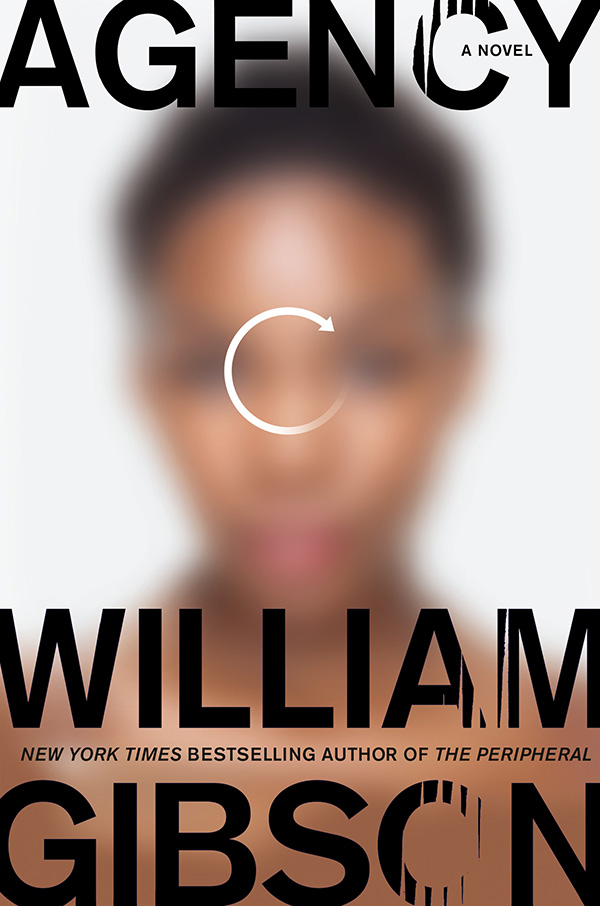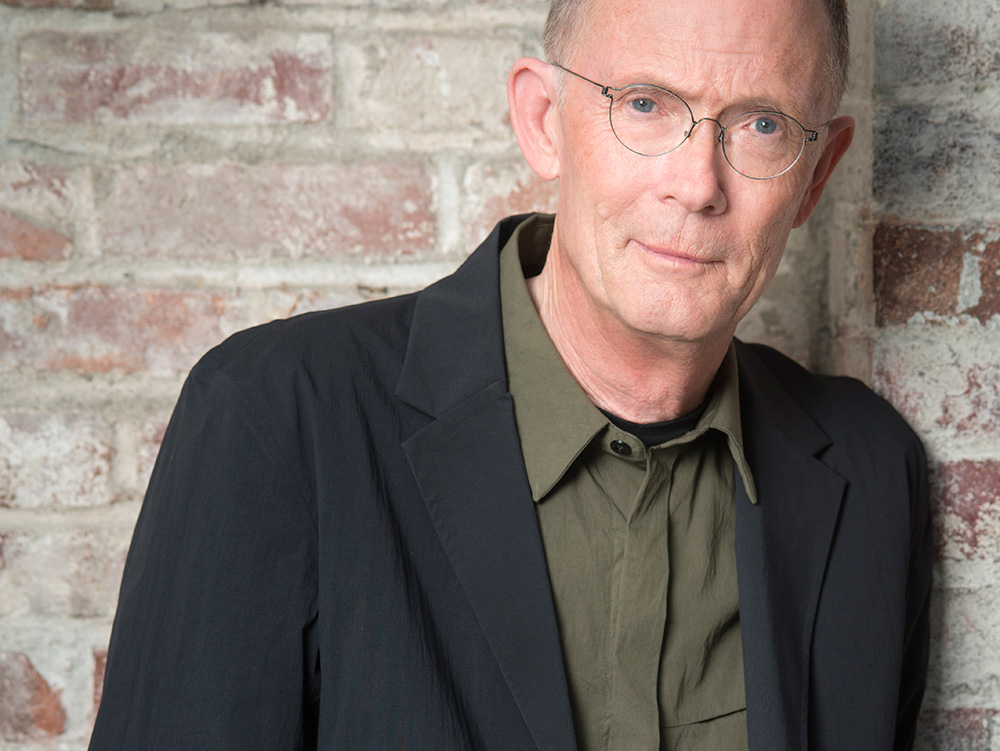William Gibson is glad to be home.
After a month of touring North American cities with his new book Agency, he’s back in Vancouver, a little jet-lagged but gentle, thoughtful and as discursive as his novels would have you expect.
One of the stranger things about being on the road, Gibson says, is forgetting that the bathroom in the new hotel room isn’t the same as the one from the night before.
I immediately picture the consequences — peeing in the sink and washing your hair in the toilet. A strange image for the godfather of what has come to be called cyberpunk.
Gibson is back in his Shaughnessy home as we talk on the phone, wandering through topics from his influences — like French filmmaker Chris Marker — to the lingering effects of Cambridge Analytica.
Our perambulatory conversation moves through fascinating asides, tangents into Gibson’s own history and the changing nature of Vancouver. After touring 20 cities, it’s nice to come home. “I like it here,” he says despite the considerable changes that have taken place in Vancouver in the previous 40 years.
Agency, released in December, is the second in a planned trilogy that began with The Peripheral.
It’s classic Gibson, a twinned tale of the recent past and the far-distant future, filled to the rafters with arcana of every stripe — cool gizmos, armoured drones, sexbots — as well as things more immediately recognizable, like failed relationships and parental guilt.
Gibson has long used the form of thrillers to subvert the very conventions of the genre.
He admits he sometimes feels guilty about an imagined businessman in a random airport, grabbing a book to read on a flight to Dubai and ending up with one of Gibson’s layered, collaged narratives that require immersion and occasionally confusion.
“Some readers really don’t like to be disoriented,” he says. “They can’t handle that level of culture shock.”
The state of cognitive dissonance comes more easily to some than others. As a reader, Gibson says he likes it.
It does take some time to get immersed in Agency, but once you’re in, you’re in.

The entry is relatively soft. In 2017, an app-whisperer named Verity Jane is starting a new job. On the run from a relationship with her former boss, an Elon Musk-like character named Stets, she’s couch-surfing and trying to figure out her next move.
In this fallow period, Verity agrees to beta test a new form of personal assistant. As soon as she unpacks a headset from a company named Tulpagenics, her life is forever changed, thanks entirely to someone called Eunice or UNISS.
Who or what Eunice isn’t exactly clear, even to herself, but from the outset it’s clear that she has capabilities that far surpass any AI program Verity has encountered. But before we can get to Eunice’s burgeoning sense of self-awareness, the threat of nuclear Armageddon rears its little mushroom head.
With that bravura start, we’re off to the races. Eunice and Verity are on the run almost immediately after their first meeting, chased by corporate mercenaries, gig economy spies, ex-boyfriends and drones from the future.
It takes a while to get up to speed in a Gibson book; you can spend the first few chapters just puddling about with the nomenclature, figuring out terms like “stubs” and “klept.” Also, I hadn’t read the first book, so I was unfamiliar with “the Jackpot,” the name given to the combined climate/pandemic/political disaster that dispatched some 80 per cent of the human race.
And it’s a challenge to keep up as the novel jumps more than a century ahead to 2136. Gazillionaires (the aforementioned klept) are still running the show, watched over by a time cop of sorts named Ainsley Lowbeer and her assistant Wilf Netherton.
Wilf has his hands full. He’s trying to prevent nuclear war in 2017 as well as keep up his end of parenting duties with a newborn baby and a wife who’s busy with her own career. Some things never change.
And some things do, like time travel.
In this future world, quantum computing has allowed the rich and bored to mess about with time, or, more correctly, with alternate timelines called stubs that broke off from the main part of history. Inside these possible worlds folks are busily living their lives, unaware that they are being monitored from the future. It’s the existence (creation) of Eunice that bridges these two worlds, bringing past and future together.
There’s a touch of Scooby-Doo and the gang in the story as Wilf and his team try to help Verity and Eunice avoid their own timeline’s Jackpot catastrophe, but there are also many interesting references to our own world. Mine and yours.
I powered through Agency in a day-long reading session, from which I emerged feeling I’d been dreaming in another universe. I try to describe that liminal state of emerging from a book to Gibson, the feeling of being neither here nor there, but somewhere in the interstitial space between.
“If my book doesn’t create that kind of space, it’s not working,” he replies.
One story that I’d long heard about Gibson was about his early experience watching Chris Marker’s science fiction film La Jetée.
When I ask him about it, Gibson launches into an extended recounting not only of the film, but everything that led up to him seeing it, as well as the impact it had on his writing.
“I’d heard about La Jetée, had read about it, but I wasn’t ever able to see it. The closest movie theatre was thousands of miles away,” he explains.
When Gibson was a child, he and his mother moved back to her hometown of Wythville, Virginia, where the biggest cinematic event was the annual screening of Thunder Road, a movie about moonshine running starring Robert Mitchum.
A decade later, when he’d enrolled in a film history class at UBC, Gibson finally saw Marker’s film.
“I thought I’d take film history class, to fill up as many credits as possible,” he says. “La Jetée was the first film they showed us. It just blew me away. That science fiction could be a viable, adult form.”
Whether you can credit Marker for putting Gibson on the path to becoming the godfather of cyberpunk is questionable, but the experience opened a way forward. Although he never met Marker, Gibson says, “I’m glad that I saw it that one time. I never saw it again.”
Film has figured large in Gibson’s work, in the form of adaptations of his own novels or the work of others.
The experience of seeing Ridley Scott’s Blade Runner when it was first released sent Gibson stumbling from the theatre in horror. “I could tell how much of my program was also Scott’s program,” he says.
The early reception for the film was also a source of some concern. “It didn’t do well at the box office, no one liked it, there were terrible reviews and it disappeared.”
At the time, Gibson was working on Neuromancer, and the initial reception to Scott’s science fiction masterpiece gave him pause, he says.
He attributes the negative reaction to the film to a clash of North American and European sensibilities.
“In North America, there is this idea that you leave your old city behind, you go west, and you build a new city.” In conventional science fiction, he said, everything is new, “the future put it there.”
Blade Runner offered a more European sensibility that linked the future and past. “That’s the power of it. It’s like a silent film. In Europe, they make the future out of the past.”
As a writer, part of Gibson’s appeal is the layers upon layers of stuff that accumulate in his narratives. Not only in the form of technology, but also in objects and things used in daily life — coffee pots, jackets, sunglasses, weird hats.
He’s been described as a collagist in his approach to story, and his appreciation for the beauty of well-worn objects comes through in Agency, whether it’s Verity’s insistence on taking her Muji bag while she’s on the run or the old-timey underpants that Wilf wears when he visits a section of London, where robots re-enact the Victorian era for tourists.
It’s easy to assume that Gibson need only peruse the headlines to come up with possible narratives, but it’s a more mysterious process, he says, adding that he’s never been interested in stories where everything is mapped out and controlled.
“If I know how it’s going to end, I get bored. There’s no surprises.”
Inside his loose, shambolic universe the most unexpected things happen. But increasingly the real world seems to be catching up to genre fiction.
Gibson admits that during any get-together with fellow writers, the immediate topic of conversation is the intrusion of real-world events: “How are we supposed to work with this material!”
One reason that Agency’s publication was slightly delayed is that Gibson kept having to rewrite the book as the real world kept moving the goal posts. The zeitgeist had changed the rules of the game, he says.
“For the first time in my life that I remember thinking, ‘Is this real?’ Following the newsfeed made me feel like I had just woken up from surgical procedure and was hallucinating.”
Although 9/11 figures large in Gibson’s world-altering moments, Brexit was also equally impactful. “I couldn’t believe that the British people would do something so self-destructive.”
Even Cambridge Analytica, with its utopian ideals running smack into a little thing called human nature, found its way into the book.
Gibson admits that he’s still amazed by the optimism of internet pioneers who thought “It’s all going to be great,” despite all the ways things could go wrong. “You don’t have a clue what people will do with this stuff,” he said.
“What I’ve always done is to take the measure of this cognitive dissonance, calibrate how much is too much. How much more can be added. Looking for that sweet spot.”
But things are changing so quickly, the sweet spot can be elusive.
Agency finds it, but in quite an unexpected place, the bathroom. The book is cannily anchored by people doing ordinary stuff — feeding babies, making dinner, going to the bathroom.
When I tell him that I liked the fact that people have to do very human menial activities in the midst of world-ending calamity, he says “I have a little Post-it note stuck to the inside of my forehead. Naturalism... even in the gravest time, people are doing ordinary things.”
One of the things that Gibson finds interesting about the process of writing is reading his work to an audience. “In a mysterious way, I learn what the book is actually about.”
It isn’t simply the feedback received from audience, he says, but being outside of the work, if only for an instant. “It’s the first and only experience that approximates a reader’s experience.”
In preparation for the third book in the series, he says he’s seeing which characters make it past the casting call and make it into the next book. Not everybody does.
“People turn up, sometimes you’re expecting them, they get hired or they don’t want the job. It’s a ridiculous process. I try to view each book as a standalone work, otherwise it simply becomes too daunting.”
Imagining the future, in this day and age, is a very complicated business, even for William Gibson.
William Gibson appears in conversation with Marsha Lederman on Sunday, March 1 as part of the Vancouver Writers Fest. More info here. ![]()
















Tyee Commenting Guidelines
Comments that violate guidelines risk being deleted, and violations may result in a temporary or permanent user ban. Maintain the spirit of good conversation to stay in the discussion.
*Please note The Tyee is not a forum for spreading misinformation about COVID-19, denying its existence or minimizing its risk to public health.
Do:
Do not: